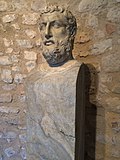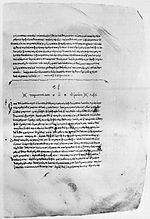Marcel Conche, Parménide : Le Poème: Fragments, Paris, Presses Universitaires de France, 1996, p. 5 and note. P. Ebner, "Parmenide medico Ouliádes"...
29 KB (3,566 words) - 15:29, 2 October 2024
Parmenides (Greek: Παρμενίδης) is one of the dialogues of Plato. It is widely considered to be one of the most challenging and enigmatic of Plato's dialogues...
30 KB (4,443 words) - 09:16, 6 July 2024
Look up Parmenidés or Παρμενίδης in Wiktionary, the free dictionary. Parmenides was an ancient Greek philosopher born in Elea. Parmenides may also refer...
361 bytes (75 words) - 03:58, 19 March 2013
Plato (section Heraclitus and Parmenides)
decisively influenced by the pre-Socratic thinkers Pythagoras, Heraclitus, and Parmenides, although much of what is known about them is derived from Plato himself...
94 KB (9,647 words) - 01:05, 6 October 2024
Caffrocrambus parmenides is a moth in the family Crambidae. It was described by Graziano Bassi in 1994. It is found in the Democratic Republic of the Congo...
971 bytes (57 words) - 08:35, 20 June 2021
up of numbers. The Eleatic school (Parmenides, Zeno of Elea, and Melissus) followed in the 5th century BC. Parmenides claimed that only one thing exists...
81 KB (10,955 words) - 17:10, 14 September 2024
representations of itself in particular objects. For example, in the dialogue Parmenides, Socrates states: "Nor, again, if a person were to show that all is one...
38 KB (5,117 words) - 01:27, 24 July 2024
Crotone. Italian philosophers of the Greek period include Xenophanes, Parmenides and Zeno. Roman philosophers include Cicero, Lucretius, Seneca the Younger...
304 KB (27,054 words) - 23:54, 7 October 2024
Nothing (section Parmenides)
Socrates and Plato largely agreed with Parmenides's reasoning on nothing. Aristotle differs with Parmenides's conception of nothing and says, "Although...
20 KB (2,860 words) - 14:39, 30 September 2024
Simplicius of Cilicia. Zeno devised these paradoxes to support his teacher Parmenides's philosophy of monism, which posits that despite our sensory experiences...
43 KB (4,627 words) - 18:24, 19 July 2024




